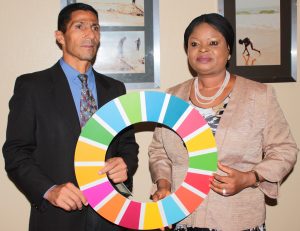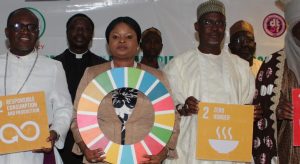The Office of the Senior Special Assistant to the President on Sustainable Development Goals (OSSAP-SDGs) has sought the collaborative efforts of the Faith-Based Organisations (FBOs) in the country to make agriculture a formidable source of eradicating poverty to facilitate the implementation of the SDGs.
The Senior Special Assistant to the President on Sustainable Development Goals (SSAP-SDGs), Princess Adejoke Orelope-Adefulire made the call in Abuja on Tuesday at a Faith-Based Agricultural Summit organized by OSSAP-SDGs in partnership with Development and Training Resources Centre with the theme: ‘’Sustainable Agricultural Revolution: The Role of Faith-Based Organizations’’.
The Presidential Aide reiterated the resolve of President Mohammadu Buhari administration to continue to explore meaningful ways and means of improving the lives of all Nigerians which is in tandem with the policy thrust of this administration that is focused on the engagement and empowerment programme for Nigerians through Agriculture.
 R-L Israeli Amb. to Nigeria Ismail Hamid and SSAP -SDGs Princess Adejoke Orelope-Adefulire
R-L Israeli Amb. to Nigeria Ismail Hamid and SSAP -SDGs Princess Adejoke Orelope-Adefulire
From inception of the implementation of the SDGs agenda in January, 2016, she said that OSSAP-SDGs has been at the forefront of ensuring that the policy, financial and institutional frameworks needed for the attainment of the SDGs are concretely established in addition to the strengthening of the relevant structures for mainstreaming, tracking, monitoring and reporting on the SDGs.
She emphasized that the SDGs framework plans to ‘leave-no-one-behind’ as it represents a universal call to action to end poverty, safeguard the planet and ensure that all people enjoy peace and prosperity, stressing that it was against this backdrop that her office was committed to engaging religious and community leaders; the private sector and development partners in support of the SDGs.
Adejoke stressed, that the FBOs by concept and practice tend to evolve from and develop on Faith Communities’ conviction that they have a moral necessity to help those most in need and improve their livelihood.
The Minister of Agriculture and Rural Development, Chief Audu Ogbeh who declared the Summit opened, was represented by the Director of Agriculture Planning, Alhaji Nasiru Adamu encouraged the FBOs to take advantage of government grants on agriculture and access them to improve their activities, adding that, “agriculture has helped Nigeria out of recession’’ thus, engagement in agriculture has created more jobs for our teeming youths and has put more food on the tables of Nigerians’’. He added.
He said before the discovery of oil, agriculture was the backbone of Nigeria’s economy; hence, there was need to go back to it.
In his remarks, the Israeli Ambassador to Nigeria, Ismail Hamid noted, that his country has one of the best agricultural technology in the world, assuring that Israel was committed to bringing its knowledge, experience, expertise and technology in agriculture to improve Nigeria’s Agricultural sector so as to help achieve zero hunger.
 L-R Representative of the president of Christian Association of Nigeria (CAN) Bishop peter Ogunmuyiwa, Senior Special Assistant to the President on SDGs Mrs Adejoke Orelope-Adefulire, Rep. of the Minister of Agriculture, Alhaji Nasir Adamu and the Rep. of the Sultan of Sokoto/Emir of Keffi, Dr. Shehu Yamusa, during the Faith Based Organization Summit with the Theme: Sustainable Agricultural Revolution: the Role of Faith Based Organizations.
L-R Representative of the president of Christian Association of Nigeria (CAN) Bishop peter Ogunmuyiwa, Senior Special Assistant to the President on SDGs Mrs Adejoke Orelope-Adefulire, Rep. of the Minister of Agriculture, Alhaji Nasir Adamu and the Rep. of the Sultan of Sokoto/Emir of Keffi, Dr. Shehu Yamusa, during the Faith Based Organization Summit with the Theme: Sustainable Agricultural Revolution: the Role of Faith Based Organizations.
Earlier, the Convener of the Faith-Based Organisations (FBOs),Prince Segun Obayendo noted that in the past, the roles of FBOs were not recognized by government, he appreciated the attention of this present administration for the call to partnership.
He maintained that the Agricultural sector remains the largest employer of labour and the highest contributor to Nigeria’s Gross Domestic Product (GDP), adding that Agriculture still accounts for over 40% of our GDP, but abysmally low in generating foreign earning through exports.
He opined that economic development programs would not be sustainable, even within their own terms of reference unless they incorporate the spiritual as well as the cultural, political and environmental dimensions of life.
Against this backdrop, he enjoined all religious and faith-based organizations in Nigeria to begin to give more attention to agricultural sector so as to make the nation a viable agrarian country with less dependence on oil.
Janet McDickson
Head,Communication
12/9/2018



